8+ Sample Distillery Business Plan
-
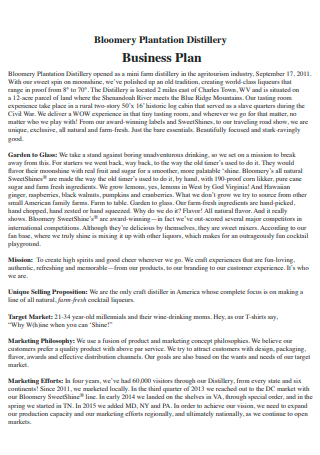
Plantation Distillery Business Plan
download now -
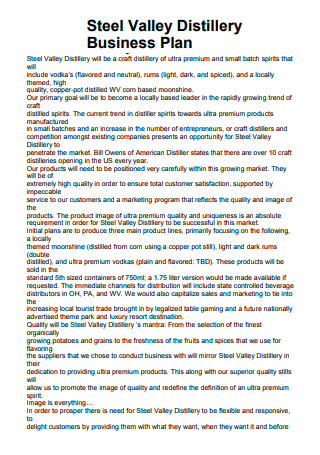
Steel Valley Distillery Business Plan
download now -
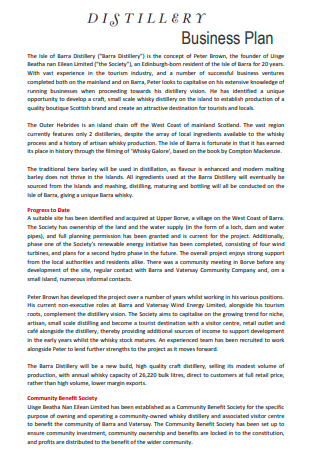
Distillery Business Plan in PDF
download now -
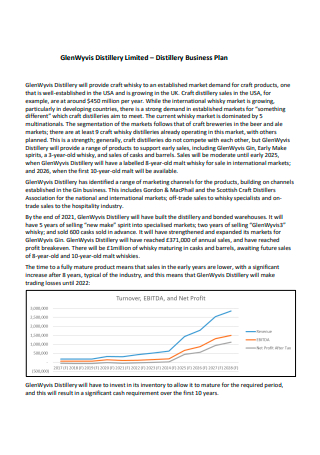
Distillery Limited Business Plan
download now -
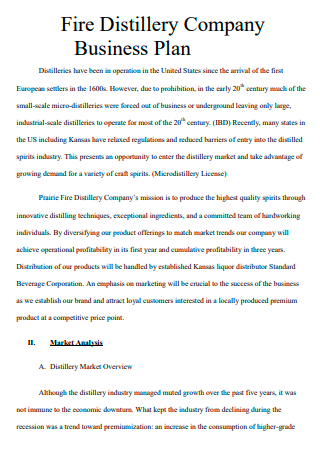
Fire Distillery Company Business Plan
download now -
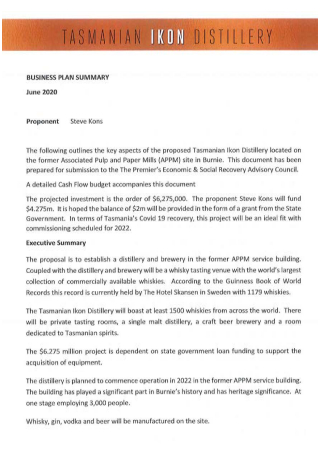
Basic Distillery Business Plan
download now -
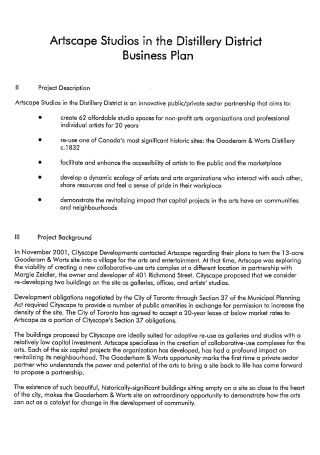
Distillery District Business Plan
download now -
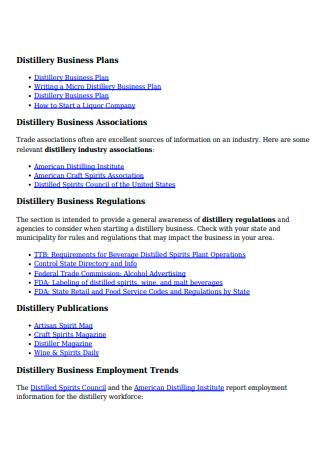
Distillery Business Plan Example
download now -
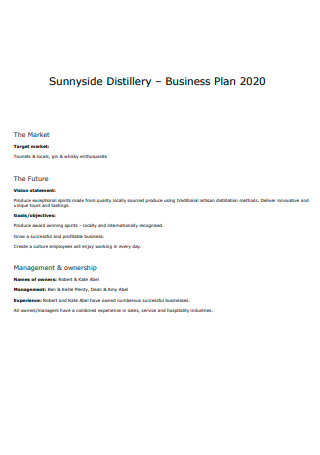
Printable Distillery Business Plan
download now
FREE Distillery Business Plan s to Download
8+ Sample Distillery Business Plan
Distillery Business Plan: What Is It All About?
Starting your Own Distillery Business
Creating that Effective Distillery Business Plan
FAQs
What is the usual operation inside a distillery plant?
What is an alcoholic drink and its classifications?
What are the skills or qualifications needed in a distillery business?
Distillery Business Plan: What Is It All About?
Let’s first touch on what a distillery is. A distillery is an establishment where the making of strong alcoholic drinks through the process of distilling takes place. Alcoholic drinks are oftentimes also called liquors or spirits. The main ingredients usually found in the making of strong alcoholic drinks are yeast, sugar, alcohol, and carbon dioxide. The actual process itself involves preparing, mashing, fermenting, distilling (evaporation and condensation), ageing, and blending. To make all of this work, a distillery needs to have the right equipment, such as stills, mills, pumps, valves, and storage tanks, the right manpower to run the whole operation, and the right business plan to start generating revenue to sustain the whole business operation.
A distillery business plan is a written document on how a business goes through the process of accomplishing its goals. It’s a marketing, financial, and operational plan to keep the distillery business operating and flourishing. The distillery is one of the oldest industries that have survived and thrived, for obvious reasons. Drinking alcoholic beverages has been a part and parcel of any culture there is, regardless of the type of drink. From the street corners to the upper echelons of the society, almost everyone has their own taste for an alcoholic beverage. It’s a source of conversation starter, or a symbolic gesture of closing a business deal. The distillery business is here to stay, and have proved to be a profitable trade through the years.
Starting your Own Distillery Business
Just like any other industry, there are a lot of things to consider when starting your own distillery business. Not only do you need a large capital upfront, you also need to have the right set of tools, the right skillset and manpower required to run the operation, the right knowledge of the whole distillation process and, of course, the appreciation and passion for alcoholic beverages. You certainly cannot go into the alcoholic beverage industry without a certain love for an American Schnapp or a good ol’ bourbon! Aside from that, here are the other things to consider when starting up a distillery business.
Creating that Effective Distillery Business Plan
Starting a business means that you need to evaluate the requirements and the risks involved in the whole operation. Since there are a lot of factors to consider when setting up a distillery business, you need to have a good and effective business plan as your roadmap. Aside from setting the guidelines and the process on how to accomplish the business goals, a business plan is also used as a documentary presentation when trying to secure funding or a startup capital from financial lending institutions or potential investors. Investors would like to be assured that the business owner has the right plans in place in generating the revenue to pay off the loan amount, as well as having the right contingency plans in case of unforeseen circumstances that would put the business operation at risk. So, how do you go about creating that effective distillery business plan?
Step 1: Give an Executive Summary
Your executive summary should contain an outline of your distillery business’s goals. It should provide a brief highlight into the business’s strategy, and could also include the mission and vision statement. The mission statement should explain what was the purpose for setting up the distillery business. The vision statement is what your business hopes to accomplish in a certain period of time. Having a well-written and well-thought of executive summary, including the mission and vision statements, could set the tone for the overall purpose of the business plan.
Step 2: Identify your Products
In this section, outline all the distillery products to be produced by your company. Your products could be based on the alcohol by volume (ABV), or could be based on the common types of alcoholic distilled drinks such as vodka, whiskey, gin, rhum, brandy, and so on. Aside from listing down the products, you could also include the prices for each product, the products’ lifespan, the manufacturing process, and applicable patents and proprietary technology that were used in the making of these products.
Step 3: Create your Market Analysis
The market analysis for a distillery business should explain what are the conditions surrounding the distillery industry and if there is a need for it in the current market. This should provide the foundation for your marketing and sales strategies later on. Part of doing a market analysis is to identify your target market, the current economic trend of the distillery industry, and your existing competitors. Another way to do an effective market analysis is conducting a SWOT analysis. SWOT means Strengths, Weaknesses, Opportunities, and Threats. Strengths are those that you identify as something good that stood out, or the unique characteristics of your distillery business. It could be that you have come up with a new brand of tequila, or your very own cocktail mix. Weaknesses are those factors in your business that need improvement, or maybe more support.
It could be in the form of lack of ingredients for producing a certain drink mixture, or even lack of funds to further develop a new product. Opportunities are those situations that you could take advantage of to further your business. These could be the current marketing platforms through social media, having a famous person to patronize your brand, and so on. Threats are those conditions or factors that could put your business at risk. Threats could come as a form of new competitors in the area, or even unforeseeable events that could affect the whole business operation such as bad weather conditions, or force majeures.
Step 4: Marketing and Sales Strategy
A marketing strategy in a distillery business refers to the strategic positioning of the distillery brand in the market. An example of a marketing strategy for a distillery business is having a good brand name, a catchy logo, and a creative slogan. These three are your business identifiers and would represent your products to the market, and so it’s best to invest and have a good product design and marketing team on board. A sales strategy is the distillery business’s specific sales action plans to acquire new customers and retain existing customers, and to generate sales revenue that can sustain the whole business operation.
An example of a sales strategy could be increasing the online presence of the distillery business in the social media platforms. Another could be increasing the number of field sales personnel to approach local bars or restaurants to promote or sell your products.
Step 5: Financial and Budget Planning
This is usually done in a financial statement format, presenting the budget/capital versus the expenditures. As a new business, you would want to itemize the list of your estimated expenses, which should include the startup and overhead costs. This would amount to the total capital you would need to secure to fund your distillery business from either financial lending institutions or from potential investors. You could also include the estimated income revenue targeted amount you could secure based from your sales and marketing plan within a given period of time.
FAQs
What is the usual operation inside a distillery plant?
Having a distillery plant usually entails a large operation. Common processes that happened inside a distillery plant involve: the distillation process itself through mash preparation, fermenting, distilling, aging, and blending; the planning and designing of new product spirits, or alcoholic drinks; the testing of the product; and the marketing and selling of the alcoholic drinks.
What is an alcoholic drink and its classifications?
An alcoholic drink is a processed and manufactured drink that contains alcohol, or also known as ethanol. It has three classifications: wines, beers, and distilled beverages. The difference between all three are usually the alcohol by volume (ABV), or the measure of the alcoholic strength found in each of these drinks classification. A regular beer’s ABV is typically around 5-10%, wine is about 12% and up, and a distilled beverage is usually around 30-40%.
What are the skills or qualifications needed in a distillery business?
Although not an “actual” requirement for setting up a distillery business, still, it would be good to have some specific skill sets or knowledge when starting the business. You have the option of pursuing courses in technical colleges such as brewing and distilling. Having a course certificate could add to your credibility as a distillery business owner. There are some organizations that offer programs and courses for a certification as a Master Distiller. Other than that, you also need to have on board and part of your business operation are some good marketing and sales staff, and some personnel manpower to run the production operation.
There’s nothing like ending a busy and stressful day with a shot of that golden liquid that warms and calms you down to your feet. And we’re not just talking about a whiskey shot here. The thing is, you have a wide variety of alcoholic beverages to choose and enjoy. That’s what the distillery business hopes to bring to its customers. A sense of enjoyment, peace, and fulfillment with every sip from their own products. Distillery businesses put a lot of effort into making that drink that keeps their customers coming back and wanting for more. Their successful planning and strategies are found in their very own distillery business plan.
Want to find out how to start running and operating a distillery business like a pro? Check out our distillery business plan templates. It is a step-by-step, easy to fill out, and easy to follow through guide that can start you off on your distillery business. Download one now, and start taking those steps towards being a successful entrepreneur in the distillery trade!
